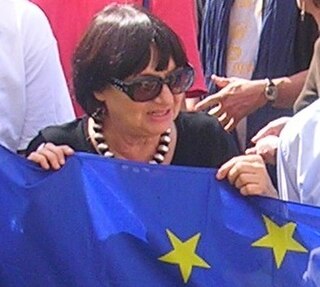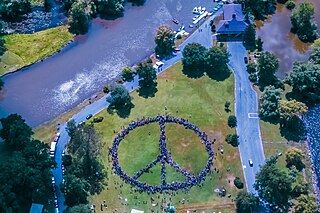
Luisa Morgantini is an Italian former Member of the European Parliament. She was elected as independent with the Communist Refoundation Party ticket and sat with the European United Left - Nordic Green Left group.

United Nations Security Council Resolution 1325 (S/RES/1325), on women, peace, and security, was adopted unanimously by the UN Security Council on 31 October 2000, after recalling resolutions 1261 (1999), 1265 (1999), 1296 (2000), and 1314 (2000). The resolution acknowledged the disproportionate and unique impact of armed conflict on women and girls. It calls for the adoption of a gender perspective to consider the special needs of women and girls during conflict, repatriation and resettlement, rehabilitation, reintegration, and post-conflict reconstruction.
Kumar Rupesinghe was a Sri Lankan academic and activist involved in social issues, particularly human rights, development issues, processes of globalisation, conflict prevention/resolution, and conflict transformation in the light of peacekeeping and peacebuilding for a harmonious coexistence among all peoples in the world.

Peacebuilding is an activity that aims to resolve injustice in nonviolent ways and to transform the cultural and structural conditions that generate deadly or destructive conflict. It revolves around developing constructive personal, group, and political relationships across ethnic, religious, class, national, and racial boundaries. The process includes violence prevention; conflict management, resolution, or transformation; and post-conflict reconciliation or trauma healing before, during, and after any given case of violence.
The United Network of Young Peacebuilders (UNOY Peacebuilders) is a global network of young people and youth organisations active in the field of peacebuilding and conflict transformation. UNOY Peacebuilders was founded in 1989 and is working with youth mostly in violent conflict and post war regions. The core activities of UNOY Peacebuilders are capacity building as well as advocacy and campaigning.
The Coalition for the International Criminal Court (CICC) is an international network of NGOs, with a membership of over 2,500 organizations worldwide advocating for a fair, effective and independent International Criminal Court (ICC). Coalition NGO members work in partnership to strengthen international cooperation with the ICC; ensure that the court is fair, effective and independent; make justice both visible and universal, and advance stronger national laws that deliver justice to victims of war crimes, crimes against humanity and genocide. The CICC Secretariat is hosted by the Women's Initiative for Gender Justice and it is based in The Hague.

Evelin Gerda Lindner is a German-Norwegian medical doctor, psychologist, transdisciplinary scholar and author who is known for her theory of humiliation.
Forward Thinking is a UK-registered charity founded in 2004 that works in the field of conflict prevention, conflict resolution, and political dialogue. The organisation primarily addresses issues related to the Gulf-MENA region and religious/secular dialogue at a political level.

Bosfam is a non-governmental organization that provides psychosocial and economic assistance to women affected by the Bosnian war of 1992-1995. It was founded in May 1995 by women participating in an Oxfam GB psycho-social 'radionice' project to support internally displaced Bosnian women. In May 1995 Oxfam deployed one of its national staff members, Munira Beba Hadzic, to coordinate and support the establishment of a local NGO out of the successful EU funded women's support project. Oxfam also supported Ms Hadzic to travel to the UN Beijing women's conference in 1995.

Leymah Roberta Gbowee is a Liberian peace activist responsible for leading a women's non-violent peace movement, Women of Liberia Mass Action for Peace that helped bring an end to the Second Liberian Civil War in 2003. Her efforts to end the war, along with her collaborator Ellen Johnson Sirleaf, helped usher in a period of peace and enabled a free election in 2005 that Sirleaf won. Gbowee and Sirleaf, along with Tawakkul Karman, were awarded the 2011 Nobel Peace Prize "for their non-violent struggle for the safety of women and for women's rights to full participation in peace-building work."
Concordis International is a non-profit organization that works alongside and in support of official peace processes. They exist to improve the potential for lasting peace. The organization has headquarters in London and country-offices in the Central African Republic and Nouakchott, Mauritania. Concordis' historical roots are in peace-building work by the Newick Park Initiative in South Africa (1986–1991) and in post-genocide Rwanda (1994–1997).

Amel Association is a Lebanese, non-sectarian, non-profit non-governmental organization (NGO), created by Kamel Mohanna in 1979, in response to the Israeli invasion of 1978.
Tecla Namachanja Wanjala is a conflict resolution, post-conflict rehabilitation, and development worker from Kenya. She was the Acting Chair of The Truth, Justice and Reconciliation Commission of Kenya. She has five children
Rima Salah is a Palestinian-Jordanian academic researcher, who holds a number of positions in international advocacy for conflict resolution and the rights of women and children. She is an assistant clinical professor at the Yale Child Study Center, and currently the chair of the Early Childhood Peace Consortium (ECPC).

Fatma El Mehdi(also Fatma Mehdi Hassan) is a Western Saharan activist. She is currently the secretary general of the National Union of Sahrawi Women. El Mehdi is also the first Western Saharan woman to attend a United Nations conference for women's rights. She has also served as president of the Women's Committee and Equality in Economic, Social and African Cultural Council (ECOSOCC). El Mehdi has lived in an Algerian refugee camp for about forty years.

Hafsat Mohammed Baba, is the former Commissioner for Human Services and Social Development in Kaduna State. She was reappointed Commissioner Human Services and Social Development in July 2019 after serving as Commissioner of Women Affairs and Social Development from 2017 to April 2019. The new portfolio meant the erstwhile Ministry of Women Affairs and Social Development was expanded to include Human Services, Youth Development and Arts & Culture which had hitherto been in other Ministries.

Nelly Mbangu is a Congolese women's and children's rights campaigner. She has been involved in many non-governmental organisations in this field and co-founded a movement to bring together 30 organisations with similar aims. She is a woman human rights defender and the coordinator of the Help and Action for Piece - Aide et Action pour la Paix (AAP). Additionally Help and Action for Piece - Aide et Action pour la Paix (AAP) works on good governance topics, conflict resolution of land rights disputes. Those issues often affect women, for this reason Help and Action for piece links these topics together to positively impact the human rights situation in locally.
The Declaration and Programme of Action on a Culture of Peace was adopted by the United Nations General Assembly on September 13, 1999. This occurred after ten months of negotiations in the context of preparations for the International Year for the Culture of Peace.

Aicha Duihi is a Moroccan Sahrawi human rights activist who is the president of the Sahara Observatory for Peace, Democracy and Human Rights. Duihi has advocated against the Polisario Front's camps in the Tindouf Province of Southwestern Algeria on the border of Western Sahara, and serves as a spokesperson for those kidnapped and those being held captive in the Polisario camps. She seeks to combat propaganda and misinformation which further marginalise vulnerable women.

The First Liberian Civil War began in 1989, when Charles Taylor 's National Patriotic Front of Liberia (NPFL) forces invaded the country in rebellion against the regime of Samuel Doe, who came to power through the 1980 Liberian coup d'état. Liberians United for Reconciliation and Democracy (LURD), Movement for Democracy in Liberia (MODEL), the United Liberation Movement for Democracy (ULIMO), as well as the NPFL utilized children as an integral aspect of their forces over the course of both armed conflicts, organizing them into factions such as the Small Boys Unit. The First Liberian Civil War as well as the Second Liberian Civil War saw thousands of children were forced to participate in armed conflict, resulting in an estimated figure of 21,000 child soldiers in need of demobilization, rehabilitation, and reintegration following the end of the Second Liberian Civil War in 2003, which concluded with the signage of the Comprehensive Peace Agreement. In the years following the war, the Liberian government was implemented measures to promote their international and national commitment to reintegrating and supporting former Children in the military.











